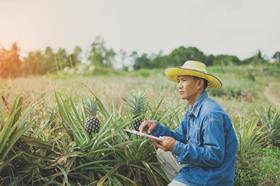
The Dole Sunshine Company has released its first Sunshine for All Progress Report, one year after announcing The Dole Promise.
The report details the steps Dole has taken to deliver on its six-pronged promise to increase access to sustainable nutrition, decrease food waste, plastics in packaging and carbon emissions, and grow value for the company’s stakeholders.
Pier Luigi Sigismondi, president food and beverages group of The Dole Sunshine Company, said in the first 12 months the company focused on establishing benchmarks, creating strategic partnerships and actions, and investing in research and development, innovation and consumer research.
“Change starts by taking responsibility for our own actions and the first step is the hardest,” said Sigismondi.
“We believe we have the potential to build a better tomorrow and have seen the results in year one. As we look forward, we can do more to contribute to better nutrition for people, do better by eliminating waste and achieving carbon neutrality and help to create prosperity by delivering shared value for all stakeholders.”
As part of its aim to provide sustainable nutrition the report detailed Dole’s efforts to leverage reformulation and innovation to ensure 47 per cent of the brand’s product portfolio contains zero processed sugar, an improvement over 2019.
To improve nutrition knowledge, it also implemented a new labelling programme, hosting programs like Sunshine for All Cities - which offers culinary arts, basic nutrition classes and access to affordable produc - and invested in consumer education with campaigns like Malnutrition Labels.
When it came to decreasing food waste and its impact on the planet, Dole introduced paper-based straps for its bananas in Korea, a move bringing the company closer to its goal of zero fossil-fuel based plastic packaging.
In 2022, it also aims to begin replacing fossil-fuel-based plastic from its pouches and Fruit Bowls packaging with paper or pulp-based sustainable alternatives as well as using polylactic acid (PLA) based stickers for fresh fruits.
According to the report, since 2019 Dole has been able to achieve a 12 per cent decrease in carbon emissions across its global operations and 34 per cent of energy used in 2020 was purchased or generated from renewable sources.
Additionally, by evaluating ways of upcycling so-called “ugly” fruit, approximately 80 per cent of Dole Thailand’s potential fruit loss for 2021 can be repurposed and will achieve 100 per cent by 2025.
Dole said its interconnected promises would create shared value for all including employees, customers, shareholders and the planet and the company collaborated with stakeholders across the supply chain to deliver this.
Its recently announced Global ESG Partnership is a unique alliance platform of renewable energy service providers that will allow Dole to achieve its 100 per cent renewable energy targets at all processing facilities by 2030.
Dole also partnered with Solidaridad to teach farmers the skills they need to grow more and earn more, while protecting the land, further contributing to their livelihood and wellbeing. The Sunshine for All Fund will also help Dole to work with innovators, start-ups and progressive partners to help deliver on the Dole Promise.



